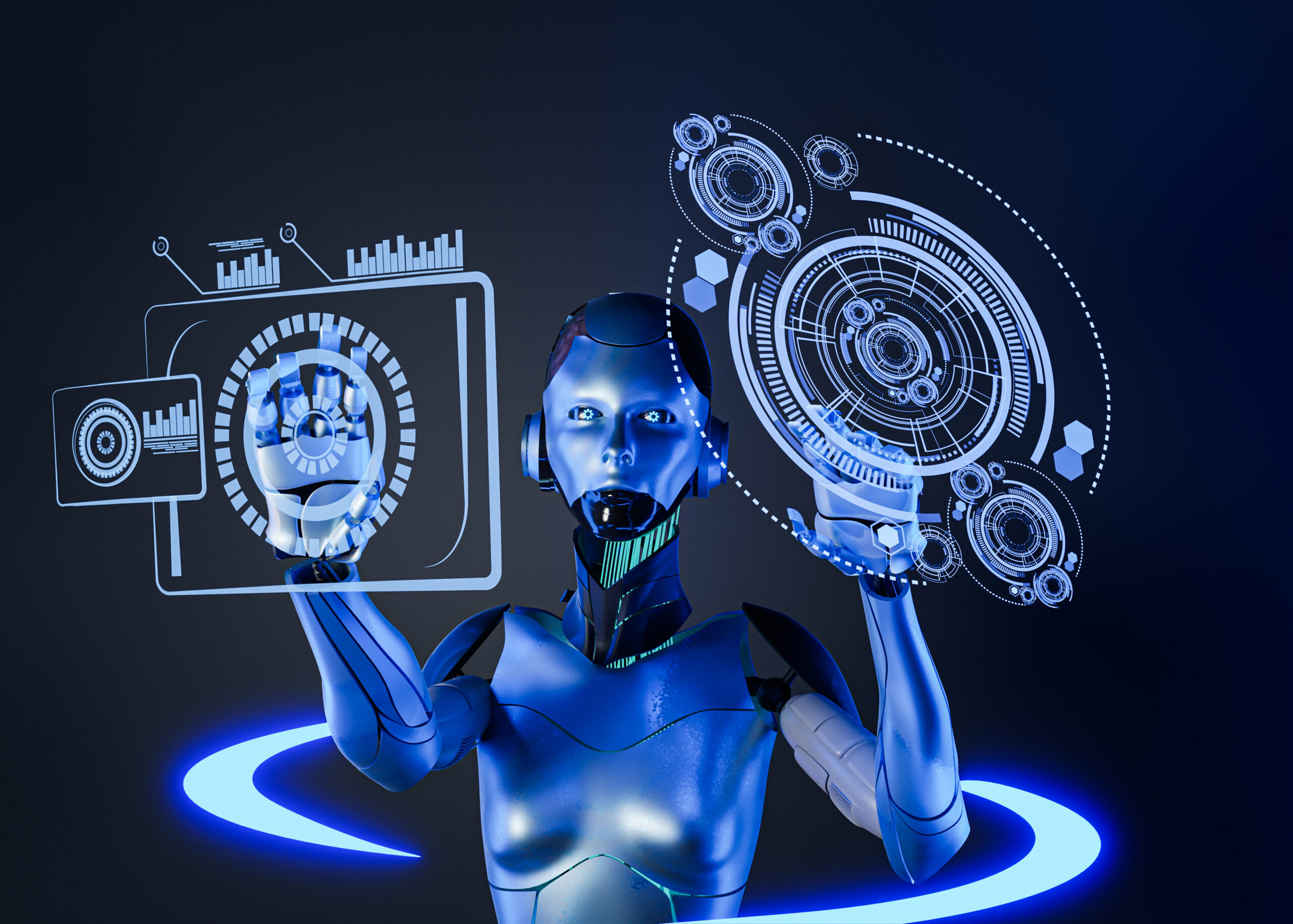Artificial intelligence in business has become an essential necessity that organizations apply to enhance effectiveness and competition across the market.Unlocking the Power of AI in Business: A Beginner’s Guide. AI’s greatest potential lies in its ability to learn a lot of information, understand what it has found, and make sensible decisions in short order. Leaders must adapt artificial intelligence in their businesses to keep up with the competition.
This article will demystify some basic AI concepts and explore how organizations like Aspire Tekhub can harness AI to deliver projects for growth, innovation, and increased efficiency.
An Introduction to AI
Artificial intelligence (AI) entails so as to embrace the use of this approach in business operations. In its essence, Artificial Intelligence (AI) is the replication of human Intelligence processes by mechanical means especially Computers.
These include the following processes: coordination (involving rules to make approximations or conclusions), manipulation and control (correcting the results by one’s self), and acquisition (gaining information and rules for application).
Human Intelligence vs. AI
Neural networks copied human thinking but are not endowed with human thinking or feelings. In fact, it processes staggering amounts of information at speeds that are beyond the capability of the human mind to process, to come up with patterns that are useful in decision-making.
Types of AI
Narrow AI
This one is for a particular purpose, or, in simple terms, it is used for, well, one thing, like the chatbots or voice assistants like Siri & Alexa. Many companies leverage narrow because they get tailored solutions.
General AI
Strong AI is also known as artificial intelligence and can be said to be largely theoretical. It means a system that is capable of doing anything that a human brain is capable of doing.
Superintelligent AI
Such an AI is said to be able to think beyond that of human beings, therefore prompting discourses on the subject of morality. Presently, AI research and its technology are still very much confined to the category of the narrow AI.
Significance of AI to Business
With the increase of competition in various sectors, many companies are insisting on using artificial intelligence to ensure they remain relevant. Here are several reasons why AI should matter to your organization
Enhanced Efficiency
AI, as a tool, saves time and ensures that the employees engage in activities that add values to the organizations. For example, automated customer interaction can handle client questions, while professional operators handle more complicated questions.
Data-Driven Decision Making
AI uses big data to identify patterns and patterns to be able to make decisions out of them. For instance, application of predictive analytics in business can be used to develop products that fit the market needs.
Personalization
Today’s customer seeks personalization more than anything else. AI makes it possible to reach out to the consumer and feel the type of market message to send as well as the products to recommend to them.
Cost Reduction
That is why changes in structures and automation of work make it possible to cut expenses dramatically. It also reduces the chances of human interferences hence lowering operational risks.
Innovation Enablement
It promote innovation because it changes traditional business models. It can create completely new products and services and thus generate additional revenues.
Key SubTopics of AI in Business
It means that for AI’s applications to be effective within an organization, an organization has to comprehend how the tool works. Below are key components that businesses need to be familiar with
Machine Learning (ML)
ML is a branch of AI that is centered on creating models through which computers can learn from data and possibly predict occurrences. These applications include customer segmentation, credit scoring and, fraud detection among others.
Natural Language Processing
NLP enables machines to comprehend human language accept operate and response naturally. It improves the customer support through use of virtual assistant and chatbots that can support natural language processing.
Computer Vision
Decision making through vision means that computer vision aims at allowing machines to analyze the images and make decision. Its applications range from face recognition to quality check of the products in manufacturing industries, hence its potential of leading to high level of automation.
Robotics Process Automation (RPA)
An ongoing process of automating repetitive human activities with the use of software technologies known as ‘bots’ is referred to as RPA. This is very relevant in organizations especially in line departments such as finance and human resources in order to manage on cost and efficiency.
Assimilating AI into Business Plan
AI cannot be developed as a separate process; instead, it has to be an extension of a firm’s business model. Here are steps businesses can follow to incorporate AI effectively
Assess Business Needs
Determine the general directions for change within the organization and the problems the organization faces as well as potential issues for development. Choose scenarios in which there is a clear need for AI and that AI can deal with – this is because the ‘need’ for AI can sometimes be fabricated.
Build an AI enabled culture
The coming of AI also bring culture change to the organization. Cultivate the culture of risk-taking, whereby the employees are challenged to embrace the use of artificial intelligence solutions. It is proposed to organize training programs for the development of the employees’ competence in AI.
Collaborate with Experts
The development of strong AI inside a firm is not always easy. Consult with technology partners such as Aspire Tekhub who offers services in implementing artificial intelligence solutions that are suitable for the respective enterprises.
Data strategy
From the foregoing discussion, it is evident that data forms the backbone to the development of Artificial Intelligence. Put in place a data acquisition and maintenance system that will ensure your institution captures on high quality and well formatted data. Use existing data sources in the process of optimizing the chosen model for AI most effectively.
Pilot Projects
It is recommended to begin with pilot projects for the implementation of artificial intelligence in order to minimize adverse consequences of machine errors. Feedback must be collected before the rollout of the solution at the organisational level since the identification of the effectiveness of the solution must be done at the departmental level.
Successful Implementation of AI by Companies
Case Study I: A Triumphant AI at the Interface of the Firm and the Consumer
Specifically, one of the retail clients of Aspire Tekhub adopted AI-powered chatbots on a company’s website. Most of the customer complaints contained in the chat were well dealt with by the chatbot hence lowering the need to wait and increasing the satisfaction levels. The bot given the ability to capture real–time data can offer instant support and hence increased chances at sales.
Case Study II: Supply Chain Management.
An example of Aspire Tekhub is that we recently resolved a manufacturing firm on prediction system for supply chain. Through using historical production data to train the AI model, it was possible to predict future requirements for inventory so as to avoid overstock while at the same time make sure products are available. This resulted into improved operational costs which was a great achievement that had to be made.
Limitations and Recommendations
While the benefits of AI are substantial, businesses must also navigate several challenges
A. Data privacy and security
When organisations acquire, process and manage large volumes of data they have to consider data protection issues. Therefore, it is critical to maintain high measures surrounding data governance to ensure that the customers’ trust is not violated.
 B. Change Management
B. Change Management
Implementing change through the use of an AI enabled process can be faced with some resistance from the employees. To make the change effective, there is the need to employ good communication and change management strategies.
C. Skill Gaps
Your employees might have some significant skills deficits when it comes to AI related technologies. One of the key issues that need to be addressed in the process of integration are training and recruitment of the qualified staff.
D. Ethical Considerations
Moreover, with increasing the application of AI in different fields, the issues of biasness, impacts on employment, and decision making transparency need to be solved. Obviously, businesses require guidelines as to how ethical artificial intelligence should be employed.
The Future Imagination of the Artificial Intelligence in Business
As technology continues to advance, the future of AI in business holds significant promise
Increased Integration into Daily Operations
AI will continue to integrate into several business procedures, which will enhance efficiency even more.
AI and Human Collaboration
In the future, humans and artificial intelligent systems shall offer better interaction thus improving efficiency and output in instances of complex innovative solutions.
Democratization of AI
The current trend to reduce the complexity of tools that incorporate artificial intelligence means that soon even small organizations will start using AI – and compete on equal grounds.
Conclusion
It will suffice to state that AI’s impact in business is incontestable. It’s not just a word to throw around but it is a force that positively changes the organizations in terms of efficiency, innovation, and customer satisfaction. To go further, this guide showed how organizations can effectively leverage of the opportunities provided by AI through proper planning and actions.
Through reducing all these, Aspire Tekhub makes it easier for any business to integrate AI into its operations which in turn allows such businesses to benefit from it in a unique and legal way. So today, as we are going deeper into technology, the acceptance of AI isn’t a luxury but a necessity for the survival of business.


